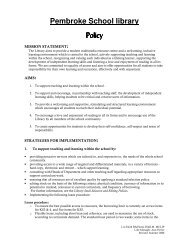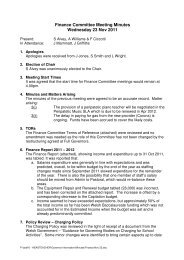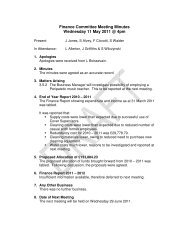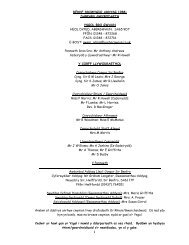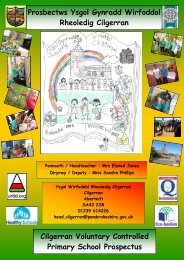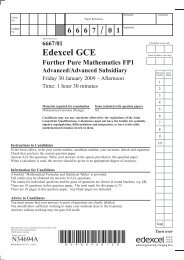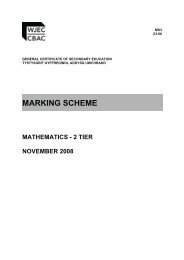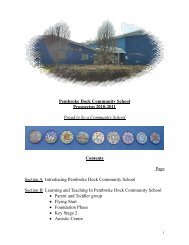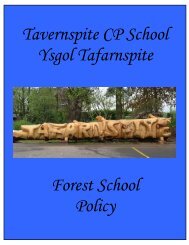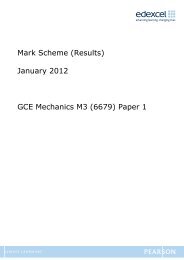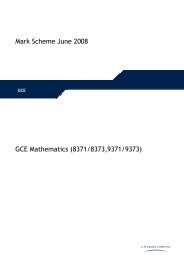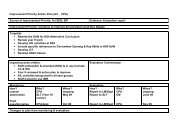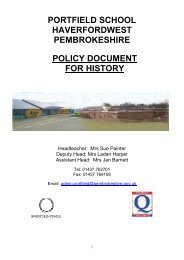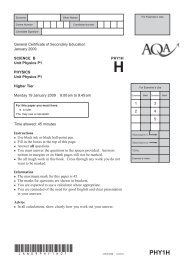Prospectus-Master%202012-13%20(18feb13).pdf
Prospectus-Master%202012-13%20(18feb13).pdf
Prospectus-Master%202012-13%20(18feb13).pdf
You also want an ePaper? Increase the reach of your titles
YUMPU automatically turns print PDFs into web optimized ePapers that Google loves.
A letter from the Head Teacher – Page 4Introduction to Portfield School – Page 5Mission Statement – Page 6Governing Body – Page 6Staff – Pages 7 to 9What is the admission procedure? & School Ethos – Page 10What are the aims of Portfield School – Page 11How is the school organised – Page 13Pupil organisation – Page 14What about external agency support? – Page 15How do pupils get to school? - Page 16What are the school hours? – Page 17What is the Curriculum like at Portfield? – Page 18Duke of Edinburgh awards – Page 19Arrangements for Religious Education, Sex Education andWelsh & foreign languages – Page 20Arrangements for careers education and work experience – Page 21Arrangements for sport and extra curricular activities – Page 21Arrangements for cultural activities and events – Page 22Pastoral care, personal and social education – Page 22Arrangements for developing sustainability – Page 22How Portfield school assess, record and report on pupil progress – Page 23How we monitor the curriculum – Page 24The annual review process at Portfield – Page 24Parental Involvement at Portfield – Page 25Portfield School’s community links – Page 26Portfield school Uniform – Page 26Safety at school – Page 27Supporting pupils medical needs – Page 27What if my child is unwell – Page 28What is our policy on smoking – Page 29Portfield school as a training centre for students &volunteers – Page 29Free school meals and milk – Page 30Attendance – Page 30Emergency closures for school and emergency plan –Page 31What to do if you wish to take your child on holiday interm time? – Page 32What to do if there is a problem – Page 32Personal accident insurance for pupils – Page 33Charging policy – Page 33Freedom of information – Page 33Equal opportunities – Page 33Destination of pupils over 16 – Page 33List of useful names and telephone numbers – Page 34Pembrokeshire County Council School Holiday Dates2008/09 – Page 35Portfield School Home – School Agreement – Page 36Portfield School’s Assessment Results – English – Page 37Portfield School’s Assessment Results – Maths – Page 38Portfield School’s Assessment Results – Science – Page 39KS4/Sixth Form Progress – Page 40Key Stage 1 Teacher Assessment – Page 41
HEADTEACHER:DEPUTY HEAD:ASSISTANT HEAD:CHAIR OF GOVERNORS:Mrs Sue Painter BEd., MEd.Mrs Ladan Harper BSc Hon.Mrs Jan Barnett BEd.Mrs Beryl Thomas- CleaverPortfield is an all age (3-19) Special School catering for pupilswith profound, severe and complex special needs through themedium of EnglishThe Headteacher Mrs Sue Painter and staff are pleased topresent this prospectus to all parents, governors and colleagues. Itcontains basic information covering the school which we hope will behelpful and informative particularly to ‘new’ parents.Whilst a prospectus cannot replace direct personal contactbetween the school and parents, it is hoped that it will support youand act as a foundation for good relations between home andschool.
“Portfield School has many good and outstanding features. Itsintegration links with the comprehensive school, with which itshares its site, are increasingly providing outstandingeducation for its more able secondary aged pupils.” EstynInspection February 2007Key QuestionInspectionGradeThe school offers a broad and balanced range of learning experiences of very high quality that allowspupils and students to continue to make progress throughout their school life.The outstanding features of the overall curriculum provided for pupils and students include the opportunitiesfor:• the development of their personal, social and learning development;• pupils with a wide range of SEN and, in particular, those with PMLD to make very good progress;• out-of-school learning, including residential educational visits and after-school club;• pupils in key stage 4 and post-16 students to gain accreditation; and1. How well do learners achieve? Grade 12. How effective are teaching, training and assessment? Grade 23. How well do the learning experiences meet the needs andinterests of learners and the wider community? Grade 14. How well are learners cared for, guided and supported? Grade 15. How effective are leadership and strategic management? Grade 16. How well do leaders and managers evaluate and improvequality and standards? Grade 17. How efficient are leaders and managers in using resources? Grade 2• the development of pupils spiritual, moral, social and cultural awareness
Dear ParentsJust a few words of welcome from all of us at Portfield School:Your son or daughter may be starting at Portfield one day soon. This prospectusshould help you know what to expect so that your child is prepared when thatday comes. We always welcome visits from parents and we also make sure newstudents have plenty of opportunities to visit the school before they start.Portfield is a friendly school where new children and students soon settle in.Our staff will look after your child’s personal needs as well as their education.Staff at Portfield work very hard to make sure all children and students aregiven every opportunity to succeed, whatever their difficulties. We expectchildren and students too, to do their best, and enjoy their work during the day.If you have any questions, please ring the school where every effort will be madeto answer your query.Sue PainterHeadteacher
Working together, Learning together, Achieving togetherAt Portfield School we strive to:-•Create a happy, safe, supportive and stimulating learning environment•Value everyone•Develop everyone’s personal, social, emotional health and wellbeing•Promote relevant academic and vocational skills•Meet individual needs through an imaginative and flexible approach•Enable all learners to achieve their full potentialHead Teacher:Chair:Vice Chair:Teacher rep:Non – teachers rep:Mrs Sue Painter B.Ed, M.EdCllr B Thomas-CleaverMrs J MountstephensMrs A George BA (QTS)Mr A EvansParent Governors:Governors:Mrs A WhiteMr P RussMiss H WilliamsMr D Parry PriceMr C BlakemoreMr J McCarthyMr R BarkerDeacon Janet JenkinsMrs Iola Phillips (Co-opted)Mrs Alison Swain – H & S CommitteeMr Gareth Wilcox – H & S CommitteeThe governing body meets once a term to discuss matters of importance to the school.Additional meetings of governor committees; finance, premises, staffing and curriculumare also held regularly. Governors voluntarily give of their own time to undertake trainingand enable them to fulfil their role effectively. Governors also pay regular visits to theschool.
HEADTEACHER•Sue Painter - B.Ed. M.Ed.DEPUTY HEAD•Ladan Harper – BSc Hons. (PSE & 14-16 Co-ordinator)ASSISTANT HEAD•Janet Barnett - B.Ed. NNEB (English & Assessment Co-ordinator)TEACHERS•Katie Pounder - BA Ed, NNEB (PE Co-ordinator)•Lisa Jones - BA Hons. PGCE (ICT Co-ordinator)•Karen Foster – BA Ed. Hons, Post Grad Cert in Autism•Caroline Wood - B.Ed Hons (Art & Sensory Co-ordinator)•Barbara Williams - Teacher Certificate (Science Co-ordinator)•Joanna Oliver - B.Ed. (Autism Co-ordinator)•Philippa Philipps-Waring - BA Ed. Post Grad Dip. SLD/PMLD (DT Co-ordinator)•Alexis George – BA (QTS) Post Grad Dip. SLD/PMLD (TLR KS3 & Maths Co-ordinator)•Lisa James - BA & PGCE (Foundation Phase Co-ordinator)•Gavin Sharp B.Ed. Hons (Geography & Sustainability Co-ordinator)•Anneka Allen Primary Education with QTS (Welsh Co-ordinator)•Caroline Ball B.Ed, MEd (History & ASD Co-ordinator)•Ginny Köther BA Hons (RE Co-ordinator) ADMIN/SECRETARY•Juliet Glanville (Sensory Co-ordinator) NNEB,•Sheila Davies, Financial Administrative AssistantBA Hons (Education Studies & Social Inclusion) •Kate Theobald, Administrative Assistant•Suzanne Whitby B.Ed, PGCE (Rights •Thelma Lewis, Administrative AssistantRespecting Schools Co-ordinator, Forest •Ceri Moremon, Clerical AssistantSchools)•Nadine Thomas, Clerical Assistant•Sue Hood CoE, Diploma in Early Years & •Amanda McDonaldPerforming Arts (Music Co-ordinator)•Christine Rigby, BA (Primary Education SITE MANAGERwith QTS)•Gareth Wilcox NVQ3, IOSH•Cally Scourfield, BA (Physical Ed.) &PGCE (Primary course)IT RESOURCE TECHNICIAN•Simon DaviesPARENT / COMMUNITY PARTNERSHIP OFFICERS•Jane Richards•Sarah Russell HLTA
SENOR LSAs•Sally Hicks NNEB•Dawn McKenzie NNEB HLTA (Vocational Education Coordinator)•Caroline Rozblat NNEB 0.5•Rachel Blowers Degree Sports & Media 0.5•Jane Chilvers NVQ3•Yvonne Goddard NVQ3•Nicki George NVQ3•Vicky Jevons Foundation Degree Early Year Practise/NVQ3•Lorraine Thomas NNEB•Fiona Tilbury NNEB•Melanie Rowland•Anna Davies Ba Ed HonsPrimary QTS•Joel Crockford•Aled Jones•Anke Wood•Kim Steer•Kerry-Anne Phillips Ba QTS(Primary 3-11)•Hayley AspinallLITERACY SUPPORT•Samantha Harries NNEB(Personnel Co-ordinator)COMMUICATION ASSISTANTS•Alison Swain NNEB•Carley Nevitt BTECNational DiplomaChildhood StudiesCLEANERS•Anne Hesse•Daniel Eley•Christina Rees•Kay Sapsford•Carley NevittLUNCHTIMESUPERVISERS•Sylvia Lewis•Meggie DaviesCATERING STAFF•StephanieMathias•Tina LawdenPHYSIOTHERAPIST ASSISTANT•Sian Phillips-Jones NVQ3•Tamara O’LearyLSAs•Sarah Cooper NVQ3 0.5•Caroline Stone NVQ3OTHER PROFESSIONALS•Physiotherapist – Gina McManamon, Nicky Cornish•Occupational Therapist – Aveline Woolf•Speech Therapist – Claire Celik, Andrea Richmond•Advisory Teacher Hearing Impaired – Catherine Scott•Advisory Teacher Visually Impaired – Gill Hill•Educational Psychologist – Lucy Harrold/Iona Williams•School Doctor – Dr F Jefferson•Specialist School Nurse – Anne-Marie Llewellyn•School Nurse – Jane Phillips•Jennie Wheeler NVQ3•Sally Rothery NVQ3•Kay Sapsford•Andy Evans NVQ Assessor Award A1•Melanie Stanswood NVQ3 training at present•Angie Davies NVQ3 training at present 0.5•James Lunt•Anne Morris•Judith Nicholls NVQ3•Jo McManamon NVQ3•Hilary Riley•Claire Morgan NVQ3 childcare (Maternity)•Emma Phillips NVQ3•Natasha Arnold•Barbara Killgallon NVQ3 training at present•Carrie Gladish NVQ 3•Gail George•Michelle Simmons•Ellen Bridger•Lisa Howlett•Teressa O’Brian•Angela Morgan•Julie Simpson•Chris Bassett•Jamie Hatswell•Richard Bevan•Owen Williams•Emma Cooper•Michelle Smith•Tracey Bailey•Karen Wheeley•Tracey Lee•Karen Brock•Jane Cornock•Annie Edwards B Ed•Jackie Gwyther•Jackie Young•Shirley Collins•Mia Harries•Catherine Brock BaHons QTS•Jamie Hatswell•Deborah Kinsella•Holly Garratt-MorganPOOL ATTENDANT•Rhian MacFarlaneCARETAKER•Daniel Harris•Monty Squelch•Daniel Eley(Relief)
Teaching in a Special School is a demanding but rewardingtask, calling for qualities of understanding, patience anddedication. In addition to initial teacher training, manymembers of staff have specialist qualifications and havegained invaluable experience in other special ormainstream schools. All teaching staff undertake in-servicetraining and the development of extra knowledge and skillsis considered a normal part of the teaching commitment.The teaching staff are ably assisted by support staff, all ofwhom have relevant qualifications and/or appropriatebackground experience.The staff at Portfield School and Satellite Centres constantlydemonstrate their commitment, dedication and skill inenabling our pupils to achieve their full potential through acurriculum tailored to meet their individual needs.
What is the Admission Procedure?Admissions are negotiated between the school, the LEA and parents. After anassessment involving parents, the present school or playgroup, school doctor,educational psychologist and other relevant professionals a Statement of EducationalNeed will be compiled. On the basis of this statement, recommendation for admissionto Portfield School may be made.This assessment process can be an anxious time for both parents and children so weencourage parents to visit the school during this period to meet staff, pupils and seeclasses.The LEA Inclusion panel makes a decision on the placement of pupils. If Portfield Schoolis recommended, the Education Authority will then confirm with parents when a place isavailable for their child and an admission date will be agreed with the Headteacher.What’s it like at Portfield School and SatelliteCentres – School ethos?There is a warm welcome and a friendly and caring atmosphere at Portfield School. Everyone isvalued, whether child or adult, for their individual part in the school. Personal development isseen as an ongoing and lifelong process and the social and emotional well-being of each childis an integral part of their learning needs. Staff work towards building confidence and selfesteemamongst their pupils who are also encouraged to be caring and sensitive to oneanother’s needs, to respect one another, to speak kindly and politely to everyone and to playwithout hurting one another by words or actions.The school promotes equal opportunities and good relations between persons ofdifferent racial groups and between males and females. The school records anyracist incidents as and when they occur and reports these to parents, governorsand the local authority.The Special Educational Needs policy details the provision and arrangementsmade for pupils. A copy is available from the office.
What are the aims of Portfield School andSatellite Centres?•To provide a broad, balanced,relevant, stimulating andchallenging curriculum thatincludes the Foundation phase ,the National Curriculum andReligious Education.To acknowledge and respect theindividuality of our pupils, whereeveryone is a valued member ofthe school community through ourcommitment to equal opportunitiesfor all regardless of age, gender,ethnic origin, socio-economicbackground or disability.To promote positive behaviour,emotional health and wellbeing forthe whole school community.To ensure that all pupils haveaccess to high quality resources,ICT, communication systems andexpertise.To provide a safe, attractive,sociable environment thatencourages fun, creativity, respectand enjoyment.To value the contribution of allstaff ,pupils, parents/carers andoutside agencies as the school’sprime resource.To build upon individual and wholeschool strengths and celebrate allachievements.To provide access to experiencesand activities that promotecommunication, self-esteem,motivation and independence.To constantly seek to raisestandards of teaching through staffdevelopment.To create an atmosphere in whichchildren and staff alike feel valuedand respected and work to the best oftheir ability for the good of each otherand the school as a whole.To equip each child with the skills,knowledge, understanding andattitudes that they will needthroughout their lives.To develop pupils skills to explore,express and manage their feelingsand emotions.To nurture confidence and a positiveself-image in each child, to enablethem to lead a contented and fulfillinglife.To promote the spiritual, moral andcultural development of pupils,encouraging values of tolerance andrespect towards all people.To develop and sustain positive linkswith the community, encouraginginclusion across a wide spectrum, asappropriate, including opportunities forwork experience.To ensure all pupils have access torelevant and appropriate work relatededucation and careers guidance.To offer opportunities for pupils to linkup with peers in local mainstreamschools and colleges. To ensure thatthese opportunities are carefullyplanned, managed and supported tomake best use of available resourcesand fulfil educational goals.To promote a healthy approach to foodand well-being.
At Portfield School and Satellite Centres anychild can expect to receive the following:-A full, balanced curriculum which follows the National Curriculumand is appropriately differentiated according to the needs of theindividual child.A wide range of educational experiences and opportunitiesappropriate to the skill levels of the individual pupil.Preparation for living as independently as possible including selfcare,personal mobility, personal self-advocacy.Preparation for life in the community including appropriate workrelated education, careers guidance, use of community facilitiesand social skills.A programme of spiritual, cultural, moral and religious educationto develop awareness of personal rights and responsibilitiestowards others and the environment.
How is the school organised – Portfield School,Haverfordwest / Satellite Centre Tasker Milward•There are two school buildings. The new purpose built secondary unit with 7 classroom basesincluding a Sixth Form arranged around a courtyard play area, along with physiotherapy,speech therapy and medical rooms and hydrotherapy pool. The lower school consists of 7classrooms and other teaching areas centred around a main hall. The satellite centre in Taskersconsists of one classroom and a quiet room.•There are 15 classroom bases in total, divided into groups of similar age and ability including:Foundation Phase, KS2, KS3, KS4 and Sixth Form classes.Sensory rooms – Primary and Secondary, including a range of high technologyequipment designed to promote sensory response and development.Class pupil numbers are much smaller than in mainstream schools with a significantlyhigher staff : pupil ratio. There is an average of 6–10 pupils in each class with 3- 5 staffdepending on the needs and abilities of the pupils in that particular class.Numbers in the Sixth Form Centre vary since a number of students attend workexperience placements and courses off site.Surrounding the school are soft play areas, a rebound wall, sensory garden, grassedsports area, polytunnels and a specially designed environmental science and naturalwildlife area which was planned and constructed through an education business link withstaff and students from the nearby Pembrokeshire College.An outdoor classroom area and wheelchair/bike track was developed by volunteersfrom Western Power and Dudley Construction.Tasker Milward Satellite Centre, there is one classroom with a quiet room in H block.Portfield School Satellite Centre – Ysgol PreseliThere are two classroom bases with a quiet area; one for KS3 and KS4/5.One class base houses a kitchen area for the development of life skillsA sensory/physiotherapy room, office/medical room, disabled toilet facilities and outdoor play area
Pupil organisation – Portfield School•As far as possible pupils are placed within their Key Stage groups.Pupils with Profound and Multiple Learning difficulties (PMLD) are grouped withina sensitive mix of pupils to ensure their particular needs for a sensory curriculumare met alongside their medical needs.Pupils with Autistic Spectrum disorders are integrated as appropriate into KeyStage groups in the Primary and Secondary phase or taught in a dedicatedgroup depending on their needs, and aspects of the TEACCH philosophy areused as appropriate.Pupils with hearing and visual impairments are taught in their Key Stage groupswith support from visiting Advisory teachers from the Local Education Authority.•Inclusion opportunities in mainstream lessons are provided as appropriate toindividual students.Pupil organisation – Satellite Centres•As far as possible pupils are placed in the appropriate Key Stage class.•Inclusion opportunities in mainstreamlessons are provided as appropriate toindividual students.
What about external agency support?The whole spectrum of children’s needs are supported through the involvement of many professionals.Speech Therapist, Physiotherapist, Occupational Therapist and School Doctor make regular visits to theschool. The School Nurse and other Specialist Consultants, Educational Psychologists and Social Services areseen as integral and indispensable contributors to the school programme.Two Speech Therapy assistants support the Speech Therapist in the delivery of individual, group and classprogrammes. Pupils who have limited communication are encouraged to make choices and communicatetheir needs and wishes through the use of objects of reference, Sign Along signs, Rebus symbols, PECs andcommunication aides.The Physiotherapist Assistant supports the Physiotherapist in the delivery of physiotherapy programmes anddeals with issues of equipment and specific problems. Physiotherapy co-ordinators in each class continuethe therapies recommended for each pupil on a daily basis or as appropriate. Some pupils’ programmes arealso carried out in water either in the school’s Jacuzzi or in the town’s hydrotherapy pool.The Occupational Therapist, who spends half a day a fortnight at the school, works closely with thePhysiotherapy Assistant. As necessary, splint and seating clinics are held regularly within the school.The School Doctor visits weekly for annual medical examinations.Some of our pupils have problems with hearing or vision andthese may have serious educational and social consequences. Ifparents are at all worried about their child’s hearing or vision theyshould contact their family doctor, the school doctor or the schoolitself. We can arrange for the appropriate tests to be carried out.For children with special problems of hearing or vision we are ableto call for advice and help from visiting teachers for the hearingand/or visually impaired following referral.
How do pupils get to school?All pupils are offered free home-school transport provided by the EducationDepartment.All minibuses and taxis have escorts to supervise and care for pupils on their journeyto school.A few pupils travel to school independently and some parents choose to transporttheir children.If your child is unable to come to school, please inform the minibus or taxi of this tosave a wasted journey. Useful telephone numbers are at the back of thisprospectus.Transport is arranged so that pupils arrive at school between 08.45 and 9.00 whenschool starts.If your child is going to be late or has to leave school early, please inform theschool by writing in the home/school book or by telephone so that lunch can beordered for your child or arrangements made should the class be involved in out ofschool activities.
What are the School Hours?Pupils arrive at school from 8.45 and are taken to their class where members of the classteam are ready to receive them ready for a 9am start.Early Years / Key Stage1 / Key Stage 2Collective Worship – Daily - class based9.05 - 9.10am Registration Once weekly Primary / Secondary Assembly9.10 - 10.45 Lessons10.30 - 10.45 Break for L1, 2, 3 and 610.45 - 11.00 Break time L4, 5 and 711.00 – 12.05 Lessons12.05 – 12.15 Collective Worship12.15 - 12.45 PSHE/Lunch Skills12.45 - 1.30 Lunchtime/Playtime1.30 – 3.05 Registration and Lessons3.05 – 3.15 Singing(21 hours Foundation Phase / KS1)(23 ½ hours teaching time KS2)Key Stage 3/4 and Sixth Form includingTaskers Satellite Centre8.55 - 9.00 Registration9.00 - 11.00 Lessons10.15 - 11.15 Break time (staggered)11.15 - 1.15 Lessons1.15 - 1.30 PSHE/Lunch Skills1.30 - 2.15 Lunchtime/Playtime2.15 - 3.00 Registration and Lessons3.00 – 3.15 Collective Worship/Singing(25 hours teaching time)Y Porth SatellitePupils arrive at Y Porth from 8.40am and are taken totheir class where members of the class team are readyto receive them ready for an 8:50am start.
What is the Curriculum like?We hope that all children will enjoy and benefit from their learning whilst at Portfield School. Abroad, balanced ‘diet’ of appropriately modified and differentiated learning opportunities areplanned and presented by staff based on the requirements of the Foundation Phase, NationalCurriculum, Pembrokeshire County Council Guidelines and the individual needs of our children.The Curriculum is planned through our own Portfield School and Equals Schemes of Work andregularly monitored, reviewed and developed in the light of new educational initiatives andgovernment directives. There is a greater emphasis on the acquisition of communication,reading, writing, number skills, ICT skills & thinking skills. Sufficient time is also given to many otherareas of study as it is recognised that children’s learning experiences should not be restricted to anarrow core, no matter how great their learning difficulties.Throughout the Primary phase, we adopt a broad topic based approach to the curriculum.Structured activities and creative play enable the children to acquire and consolidate the basicskills, attitudes and concepts necessary for them to operate as independently as possible in bothlearning and life skills situations.A range of activities are organised to support children’s development including visiting professionalssuch as specialists in particular skills e.g. Pottery. There is also a trained aromatherapist on the staff todeliver massage and aromatherapy sessions.During the Secondary phase, pupils continue to follow the National Curriculum through a mixtureof thematic and a vocational pathway which culminates with a presentation of the NationalRecord of Achievement. Time is also spent on work experience placements, community serviceprojects, Duke of Edinburgh Scheme.Link programmes with other schools and vocational providers help to provide pupils with theopportunities to develop independence and responsibility in order that they may strive towardsliving their lives to the full on leaving Portfield School.Strong links have been developed with Pembrokeshire College, Portfield Adult Training Centre, TheAvenue at Tenby, The Anchorage at Pembroke Dock, Mencap Gardens at Stackpole and manyother organisations who provide a range of vocational opportunities for our young people. Our pupilsare able to gain accreditation through a range of nationally recognised awards which include:-ASDANASDANOCROCNPersonal ProgressLiteracy and Numeracy in Everyday LifeLife and Living SkillsModules in Independent Living and Sexual Health
The school offers a life-skills programme encouragingindependence from the earliest stages. The development ofpersonal qualities plays a significant part in the life of the school withpupils encouraged to acquire self-discipline through a carefullystructured curriculum which is delivered in a well organisedenvironment. Progression throughout the Key Stages enables pupilsto become more self-reliant. Residential visits offer many pupils theopportunity to extend independence skills at centres such asLlangrannog or Red Ridge.Three minibuses are in constant use supporting the educationalprogrammes available including all curriculum areas, especially thePE programme of swimming and outdoor pursuits such as Riding forthe Disabled and a range of other educational and social activities.The school works as a member of a countywide Federation thatdelivers the 14-19 curriculum in a collaborative structure to pupilswith severe learning difficulties . This enables students to have abroader choice and entitlement in following their appropriateLearning Pathway.
Arrangements for Religious EducationReligious education is a compulsory subject within the whole nationalcurriculum and is taught in accordance with the school RE scheme of work andguided by Pembrokeshire agreed syllabus.It is compulsory for all pupils to attend a collective worship which is broadlyChristian in narrative with a short reflective time, unless parents make a specialrequest for their child to be excluded from such activities, in which case parentswishes will be respected. Sixth Formers have the right to withdraw themselvesfrom collective worship.Arrangements for Sex educationSex education is dealt with in a sensitive manner through the PSD (Personal and Social Development)Curriculum. The Governors have decided that Sex education will not form part of the junior curriculumexcept in exceptional circumstances. A programme established for secondary aged pupils at 16 isdelivered in conjunction with the school nurse. Parents are consulted and required to give permission fortheir child to take part in this programme.Arrangements for Welsh/Modern Foreign languagesThe majority of pupils access Welsh, and in KS3, Modern Foreign Languages. Some pupilsare disapplied through their Statements of Special Educational Need from both Welsh as a2 nd language and MFL. However pupils will experience and learn incidental Welsh througha range of activities to support the development of Cwrriculum Cymreig. All pupils areinvolved in activities to develop an awareness of the Welsh culture. This ensures pupils havethe benefit of learning their native language and experiencing activities to support theircultural heritage.In Y Porth, Preseli, a small number of subjects are delivered through the medium of Welsh.
Arrangements for Careers Educationand Work ExperiencePortfield School provides all pupils with their entitlement of work related education and careersguidance regardless of disability.All pupils are involved in a transition review at the age of 14 years when the careers adviser SianGardner discusses options with the student and the family. Opportunities for work experience areprovided either ‘in house’ or in local establishments.Arrangements for sport and extracurricular activitiesAt Portfield School we believe that increased levels of physical ability lead to improved levels ofphysical well being, positive attitudes and self-confidence.All pupils take part in physical activities during each week. Suitable clothing is required whichshould be brought to school in a bag with all items clearly marked with the child’s name.The school has a hall, grass field area and playground which incorporates climbing equipmentand a sensory garden. These are used extensively to support curriculum activities. The schoolalso utilises Tasker Milward Comprehensive facilities.The Satellite Centre utilises Ysgol Preseli facilities.Through the Riding for the Disabled Association, many pupils have the opportunity to ride atsome stage in their school life. Pupils ride at The Bowlings Riding stables and all equipment isprovided by the stables. Warm, old clothing is appropriate for this activity.Pupils have the opportunity to develop confidence and learn to swim at the local LeisureCentre or the school’s hydrotherapy pool. Pupils can gain water skills and distance awards asthey improve.Our pupils have been extremely successful in local bowling/gymnastics/football and Boccia competitions and have also taken part inathletics, fun runs and other sporting events.Sports Day takes place in June/July where pupils display their abilities infield and track events, and a swimming gala for upper school pupilstakes place annually.
Arrangements for cultural activities and eventsWe endeavour to help the children’s all-round development by providing a range of experiencesthat will enhance their understanding and knowledge as well as offer cultural opportunities e.g.educational visits to Llangrannog, workshops with groups such as India dance.Supporting pupils who are Looked AfterThe designated member of staff responsible for promoting the educational achievement oflooked after children is the Headteacher. The school’s policy on supporting looked after childrenis available at the school or on the school’s websiteArrangements for Pastoral care, Personal and SocialEducation and BehaviourPersonal and Social Education is an important part of our health education curriculum. Thisprogramme covers issues such as stranger danger, health and hygiene, personal relationships,physical development and sex education.The pastoral care of pupils is the responsibility of all class staff with the overall responsibility lyingwith the Headteacher. Please also see our Behaviour, Anti Bullying Policy and Positive HandlingPolicy on our website. Staff at Portfield are trained in positive handling strategies and techniques.Positive handling will be reported to parents.We are part of the ‘Healthy Eating Schools Project’ and encourage all our pupils to have a healthydiet. A tuck shop is available for Key Stage 3 and Senior pupils which sells healthy snacks.Arrangements for Developing SustainabilityAs part of the work we do on sustainability we encourage pupils to think about theenvironment and we are actively involved in recycling paper, cardboard, textiles and fruitand vegetable waste. Pupils are encouraged to ‘reduce’ i.e. save energy by switchinglights off, ‘re-use’ i.e. plastic bottles and ‘recycle’.
Portfield School’s Community LinksPortfield School is very much part of the community with growing industrial links, a communityvisits programme and involvement of local Churches. Pupils make use of local facilities forexample shopping in local supermarkets, visiting local parks and utilising local forms oftransport such as the rail link to Milford Haven.Portfield School UniformWe have a school uniform which, though not compulsory, is encouraged. Our school colour is blue. Orders areplaced termly and order forms are sent out to parents offering a variety of items including:- Red polo shirts, Navyblue sweatshirts, fleeces and PE kit. We encourage all pupils in the Primary and Secondary sector to wear schooluniform. Portfield School Council consulted pupils with respect to Sixth Form uniform and has introduced blacksweatshirts and white polo shirt with Portfield School logo for pupils aged 16-19.We would like children to wear suitable low heeled shoes to school.School uniform grants may be available from Pembrokeshire County Council for those children in Yr 7 and above.Other items of clothing we encourage are black/grey trousers/skirts.PE kit is also required and includes blue logo t-shirt and black /navy shorts.Occasionally children lose or misplace articles of clothing so please help us to find themby marking all garments with your child’s name.Pupils who attend inclusion opportunities at Tasker Milward School are encouraged towear a bottle green Taskers sweatshirt for PE and a Tasker Milward Rugby shirt.Satellite Centre – Y PorthMaroon Jumper with Portfield /Preseli logosWhite polo shirt with Portfield/Preseli logosBlack trousers or skirtPE Kit Ysgol Preseli Maroon Rugby ShirtSatellite Centre – Tasker MilwardGreen Jumper with Taskers logosRed polo shirt with Portfield logosBlack trousers or skirtPE Kit Taskers Rugby Shirt & Black Shorts/Joggers(depending on year group, please ask class teacher)
Safety at Portfield School & Satellite CentresThe Headteacher and governors are aware of the concerns of parents everywhere regarding schoolsecurity and the following precautions have been taken;•A key-pad entry system is connected to the front and rear entrance. Perimeter fencing is in placearound the vulnerable areas of Portfield School. Satellite Centres are based in Ysgol Preseli and TaskerMilward School. Pupils are supervised and follow the security arrangements within respective schools.There is no perimeter fence in either school.•Visitors must sign in (and out) in a book at the reception desk before being given an identity badgewhich must be worn whilst on the premises.•Anyone not recognised and not wearing a badge will be intercepted and challenged by staff andthe Headteacher immediately informed.•Fire drills take place termly and fire equipment is checked and serviced regularly. A full fire riskassessment has been carried out and is updated annually in consultation with the local Fire SafetyOfficer.•Appropriate CRB checks are made on all staff employed or regularly working at the school.•Systems are in place to escort irregular visitors who may need to be on the school site for a shortperiod of time.•The full child protection parent and pupil policy are available, on request, from school or on theschool’s websiteSupporting pupils medical needsWe understand that many children have to take medication prescribed by the family doctor ora paediatrician. The school will administer medication to pupils as long as parents give clearwritten instructions.The school should be informed immediately, in writing, of any changes in a child’s medication,whether this medication is administered at school or at home.The school doctor and specialist school nurse will complete a Health Care Plan for each pupilwhich will be sent to parents for checking before being distributed to the class teacher, HollyHouse staff (as appropriate), parents, school doctor and pupil’s file.All prescribed drugs and medicines (including cough mixtures, inhalers and any other drugsbought over the counter) should be clearly labelled with the pupil’s name and details ofdosage, frequency - with time of last dose given, and any other relevant information from themedical practitioner responsible for the prescription. Parents are requested to ask GPs toprescribe medicines that can be administered out of school hours wherever possible.
Medical Needs Continued…The drugs and medicines (in the dispensing chemist’s container) should be sent into and out of school ONLY in aspecial zipped bag that will be provided by the school on request.The container should be handed from parents/carers to a responsible adult working for the school transport serviceswho will, in turn, hand the container to either the class teacher or a class assistant. No drugs or medicines should besent either to or from school in pupil’s bags or coats and on no occasion should pupils ever have unsupervisedaccess to their medication.All drugs and medicines will be safely stored in a lockable cabinet on the school premises and will only be removedfor the purpose of administering the medication.What if my child is unwell?If your child has been ill, e.g. with chicken pox, etc. there is often conflicting advice on the amount of time they should be absentfrom school, depending on the doctor they see. To make things easier for you we have asked the Health Authority for guidanceand have set out below advice about the most common illnesses and infections.Measles: Children are infectious for 5-6 days before the rash appears and for 5 days after the temperature returns tonormal.Mumps: Children are infectious two days before the swelling appears and then until the swelling subsides.German Measles: Children are infectious seven days before the rash appears and at least 4 days after the rash hasgone.Chicken Pox: Infectious until no more spots appear and crusts are dry.Threadworms: Very infectious. Children should not be in school until the problem has been cleared by treatment fromGP.Impetigo: Highly contagious, spread by direct contact. Needs treatment from the GP. Patches must be covered ifchild is sent to school.Ringworm: Treatment from the GP. Once children have been treated they can continue with swimming and PE.Conjunctivitis: Highly contagious, one day off after treatment has started.Head-Lice: Responsibility for checking children’s hair for head-lice rests with the parent and should be done regularly- several times a week.Sickness or Diarrhoea: Highly contagious, should be clear of symptoms for 48 hours before returning to school.If your child is suffering from one of the above, please complywith these guidelines for the benefit of other children and staffin school.
What is our policy on smoking?We operate a no smoking policy for staff within the school grounds in line withLEA recommendations.Portfield School as a Training Centre for Studentsand VolunteersWe often have volunteers and students from local schools and colleges, EducationBusiness Partnership, Princes Trust and other organisations working at Portfield as part oftheir education or work experience.Volunteers and students provide support in a variety of ways, assisting with swimmingand horse-riding, accompanying groups on out of school activities and helping withclass activities.All adult volunteers must provide references and CRBclearance and must be agreed by Pembrokeshire CountyCouncil. These procedures are followed to ensure theprotection of the children in the school. If you would liketo provide voluntary support to the school please contactthe Headteacher. It is school policy for parents not tosupport in their own child’s class.
Free School MealsFree school meals are a right if your circumstances necessitate. If you feel you may be eligibleplease ask the school for details and application forms. The school catering service providesvery good lunches, prepared and cooked on the premises and children are encouraged totake school lunches which can be liquidized if necessary.School MealsApproximately 90% of pupils eat school dinners. These are nutritionally balanced and a rangeof dietary requirements can be provided for.Free milkThrough the Pembrokeshire County Council School Milk Scheme, children under the age of seven can, if theywish, receive 1/3 pint of free milk per day. Although there are some nutritional benefits, some pupils are allergicto cow’s milk or suffer lactose intolerance. In this case, children should not drink cow’s milk.AttendanceParents of registered pupils of compulsory school age are under a legal duty to send theirchildren to school regularly and risk prosecution if they fail to do so.If your child is absent for any reason, please inform the school bytelephone if possible and then provide a brief note of explanation inthe home/school book on his/her return.If your child has a hospital or other appointment and will be eitherarriving late or leaving early, please inform the school so that a dinnercan be ordered for your child if necessary.The Education Regulations 1991 state all schools must report on the rateof unauthorised /authorised absence which are included in Nationalleague tables published annually.Average attendance Authorised absences Unauthorised absences89.78% 10.05% 0.16%Whole School Attendance Figures 2011/12
Emergency Closures for SchoolsSituations may arise in the future, as they have done in the past, when it will become necessary to close the school.Reasons may include bad road conditions, failure of water supply or failure of the school’s heating system. It is theHeadteacher’s responsibility to decide whether the school can open, or should close early, in the light of prevailingcircumstances.The school will continue to operate whenever possible providing, of course, that children and staff are not exposedto unacceptable conditions at school or on their way to and from school. We will not send children home simplybecause we cannot offer a full service. We understand the worry, inconvenience and even dangers which can becaused by early closure.Should conditions be such that it does become necessary to close the school, parents will be informed bytelephone.We ask parents to help us to combat emergencies in several ways. First, we ask you to keep us informed of wherewe can safely send your children if we have to close early. Second, we ask you to provide us with an emergencytelephone number so that you can be contacted should the need arise. Please do not ring the school duringemergencies so that telephone lines may be kept free for vital calls.School Emergency Plane.g. In the event of Fire / Bomb Threat / Severe WeatherParents should ensure that the school has an emergency contact number where we can reach you at alltimes.Radio Pembrokeshire will give regular announcements and school closures will be shown on thePembrokeshire County Council website. The school will contact parents on home or emergency contactnumbers and will arrange with the transport department to collect pupils and take them home as soon asparents have been contacted.In the event of severe weather e.g. heavy snowfall in the county (even if it is not falling in your immediatevicinity) it may be necessary for your child to come home as the severe weather may be unpredictableand localised.
What to do if you wish to take your child onholiday in term time?Parents are asked that, where possible, holidays should be taken within the school holidayperiod and not during term time.Dates of holidays are issued annually by the school, please see dates at the end of theprospectusPermission may be granted by the governors, via the Headteacher, for a pupil to be grantedleave during term time for an annual holiday for a maximum of two weeks in any one academicyear.Parents are requested to ask the school for the appropriate application form when makingrequests for leave of absence for their child and to give as much notice of the intended holidayas possible.What to do if there is a problem?The school’s governing body has a complaints procedure which covers complaints made byparents and others. A copy of the complaints procedure can be requested from the school or isavailable on the school’s website.Any parent, or other concerned person, who may have a complaint is encouraged to first discusstheir concern informally with the Headteacher. She and her staff are committed to dealing withparental concerns, to resolving misunderstandings and to providing real solutions as speedily aspracticable.All members of staff are encouraged to respond personally to concerns which parents and childrenraise with them.If it is considered appropriate, your concerns will also be passed to theHeadteacher who would wish to respond with sympathy and understanding. Ifparents are not satisfied with the head’s handling of this complaint they shouldinform her of this and request her to pass on the complaint to the Chair ofGovernors who will discuss the issues raised with you. The Chair of Governors mayrefer the issue to the governing body for their consideration if required.
Personal Accident Insurance for PupilsPembrokeshire County Council have combined liability and insurance cover for schools visitsand home/school transport.Charging PolicyParents are asked to make a voluntary contribution to some of the activities the pupilsparticipate in such as visits to the theatre. Parents are asked for voluntarycontributions for cooking and making toast, however there is a charge made for allresidential visits.Freedom of InformationThe school is registered with the Data Protection Commission. The school has aFreedom of Information Publication Scheme which sets out:The classes of information which we publish or intend to publish.The manner in which information will be published and whether the information isavailable free of charge or on payment.A copy is available from the school on request.Strategic Equality Policy & Plan & Disability Access PlanAt Portfield School we intend to create an equal opportunities environment in whicheveryone is enabled to fulfil their potential and to feel pride in their personal identity.The school has a Strategic Equality Policy and Plan.We are committed to supporting the achievements of each and every person inthis school and to develop our pupils as learners, with dignity and self-respect.We are committed therefore to challenging racism, classism, sexism anddiscrimination based upon sexuality, special educational needs or perceivednotions of ability or disability.Destination of pupils over 16 years 2012Most pupils opt to stay in school until the age of 19 years.2 pupils residential college (Yr 11 & Yr 13 pupils)4 pupils – Pembrokeshire College (Yr 14 pupils)1 pupil – Independent Accommodation Package (Yr 14 pupil)1 Pupil – Social Activity Centre (Yr 14)
List of useful Names and Telephone NumbersSchool Doctor 01437 773857School Nurse – Community Children’s Nurse – Anne-Marie Llewellyn01437 762701 or01437 773850- School Nurse – Jayne Phillips 01437 771378Satellite Centre School Nurse – Nerys Hawkins 01239 831313Physiotherapy Dept. - Helen Clark, Nicky Cornish, Gina McManamon 01437 773261Occupational Therapy Dept. – Aveline Woolf 01437 773052Speech Therapy Department – Claire Celik, Andrea Richmond 01437 773393County Hall, Haverfordwest – Education Dept. 01437 764551Educational Psychologist – Lucy Harrold 01437 775015Principal Officer Services to Children 01437 764551Social Services Department – Sue Young, Senior Social Worker 01437 776322Pupil Support Officer 01437 765394School Transport – Matthew Johns 01437 775222Friends of Portfield School:-Peter Russ 01834 861618Alison White 01437 781817Heidi Williams 01646 686210Careers Wales West – Sian Gardner, Helen Williams 01239 622100Barnardos Family Link – Deidre Connell 01646 687064Advisory Teacher for Hearing Impaired – Catherine Scott 01437 776506Advisory Teacher for Visually Impaired - Gill Hill 01437 776506Action For Children – Diane Beacroft 01437 761330Mencap Cymru – Barbara Teague 01267 232256 (Ext: 301)



